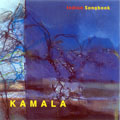Home » Jazz Articles » Album Review » Kamala: Indian Songbook
Kamala: Indian Songbook
More recently, there has been a rediscovery of oriental music. Not all attempts to bring this to a wider audience have been resoundingly successful. John Coltrane and Bill Laswell are two musicians who made some of the most memorable expeditions into the musical landscape of the Orient—in this instance, especially India. They owe the success of their productions to absorbing the soul of the ancient civilization and recognizing its right to live and breathe and co-exist with western idioms in the musical dialect. (Remember Meditations by Coltrane and Laswell’s many Indian musical expeditions, notably the Ritual System series.
Now comes Indian Songbook by Kamala, the Swiss collaboration between Adrian Mira (clarinet, alto and piano), Bruno Steffen (piano, harmonium, synthesizer), Lenz Huber (bass, loops, samples) and Andy Oswald (drums, percussion). The album takes devotional music from Kerala, a state in South India and weaves it into the sensibility of the jazz idiom and it the experiment works wonderfully. This is because the harmonic complexity of the source material (always completely improvised around a theme dedicated to a pantheon of gods, times of day and soulful meditation) remains largely intact and takes on a new life of its own in the idiom of jazz.
“Oru Mandiram” is an excellent example of how trance music heard only the temples of South India may now be heard around the world in the soundscape of jazz. The meditative quality of the music is hardly suppressed, but, instead is given a new lease on life! “De Darshan Ma” (a cry to the Mother Goddess to show her face) is another outstanding interpretation of the devotional hymn to the androgynous form of the life-sustaining goddess of Indian mythology. The reason for its success, in the opinion of this writer is twofold: an inspired choice of instruments and instrumentation, and the ability of all four musicians to feel the soul of Indian devotion in its music. The deeply woody sound of the Mira's clarinet and the the drone of Steffen’s harmonium whirling around the driving beats of Huber’s bass and Oswald’s percussion effects brings the musicians and music together in an exquisite gossamer sheet of sound.
If more musicians made the effort to imbibe the spirit of the Indian cultural ethos, to dream Indian and allow the mesmerizing nature of Indian spiritualism to enter their souls we would have more of this kind of music to discover.
Track Listing
Prabhu Misham; Varde Mata; Oru Mandiram; Kaisa Sandesha; Nocturne; De Darshan Ma; Ja Jai Durge
Personnel
Adrian Mira (clarinet, alto saxophone); Bruno Steffen (piano, harmonium, synth); Lenz Huber (bouble bass, bass guitar, loops); Andi Oswald (drums, percussion)
Album information
Title: Indian Songbook | Year Released: 2004 | Record Label: Brambus Records
< Previous
Bassist John Ore
Next >
Third Eye
Comments
Tags
For the Love of Jazz
 All About Jazz has been a pillar of jazz since 1995, championing it as an art form and, more importantly, supporting the musicians who create it. Our enduring commitment has made "AAJ" one of the most culturally important websites of its kind, read by hundreds of thousands of fans, musicians and industry figures every month.
All About Jazz has been a pillar of jazz since 1995, championing it as an art form and, more importantly, supporting the musicians who create it. Our enduring commitment has made "AAJ" one of the most culturally important websites of its kind, read by hundreds of thousands of fans, musicians and industry figures every month.



















